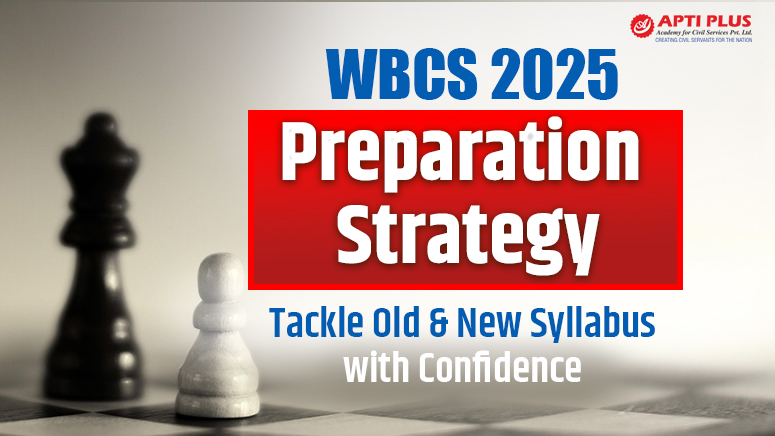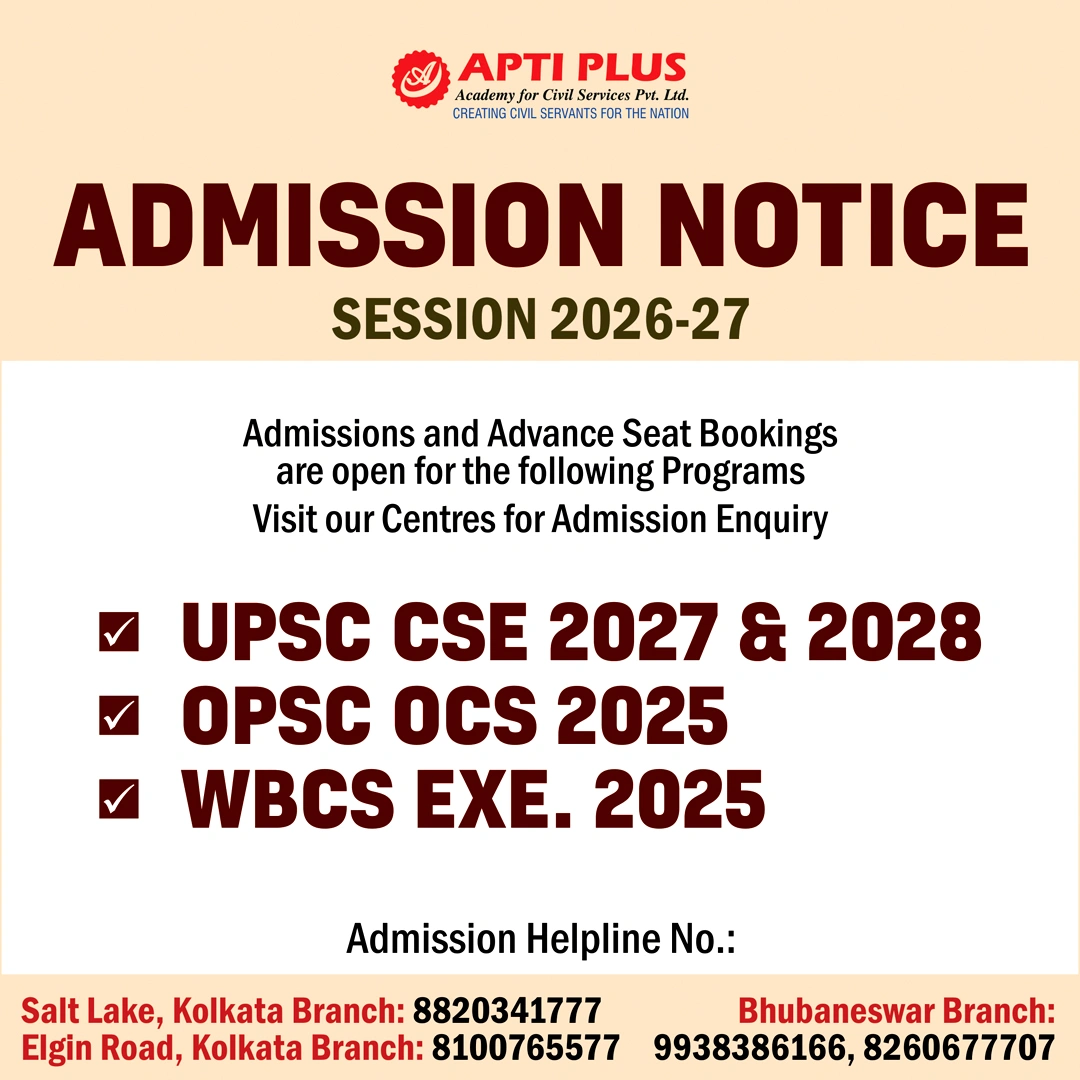The West Bengal Civil Service (Executive) Examination, or WBCS, has recently been in the news for its rapidly changing syllabus announcements. On May 28, 2025, the State Government officially cancelled the earlier notifications regarding the UPSC-style revamp of the WBCS exam. This move has created confusion among aspirants, particularly those who had started adapting to the newly proposed pattern.
Let’s understand what this means for students and how different categories of aspirants — freshers and veterans — can align their preparation strategies to tackle this uncertainty.
What Happened with the WBCS Syllabus?
Initially, the West Bengal Public Service Commission (WBPSC) had announced a comprehensive revamp of the WBCS exam from 2025. This included a two-paper preliminary exam and a 10-paper mains exam with descriptive answers, much like the UPSC format. The aim was to assess analytical ability and written communication along with factual knowledge.
However, this change has now been rolled back. As per the latest statement by the Department of Personnel and Administrative Reforms (PAR), the old pattern of the WBCS exam will continue. The revised notification introducing UPSC-like descriptive mains papers and detailed essays has been stalled.
What Should Students Do Now?
The sudden rollback has led to confusion among aspirants, especially those who were already studying under the assumption that the new pattern would be implemented. But don’t worry, here’s how you can realign your preparation to stay on track.
Strategy for Long-Time Aspirants (4–5 Years of Preparation)
Aspirants who have been preparing for the WBCS for the past few years are already familiar with the older MCQ-based format. Here’s what they should focus on:
- Revise Old MCQ Material
Stick to the tried-and-tested preparation materials you’ve been using for the MCQ-based Prelims and Mains. Prioritize factual accuracy and speed over analytical elaboration. - Mock Tests & Time Management
Regularly practice mock tests to improve time management, especially for the Prelims. Make sure you simulate the real exam environment. - Previous Year Papers
Go through the previous years’ question papers to identify question trends, frequently asked topics, and weightage across subjects. - Ignore the Descriptive Approach (For Now)
Since the descriptive UPSC-style format has been dropped, do not waste time mastering essay-writing and long-form answers. Concentrate on MCQ-style objective questions.
For New Aspirants Starting Fresh
If you are a fresher and began preparing according to the now-cancelled new syllabus, don’t worry. You can still use the skills you’ve started building, but here’s how to steer your efforts more effectively:
- Blend Descriptive Learning with MCQ Focus
The conceptual understanding you’ve gained through descriptive study is valuable. Use that knowledge to master MCQ questions. Shift your focus to solving objective-type questions without abandoning your deep learning approach. - Start with the Basics
Build a strong foundation by studying NCERTs, standard reference books, and state board books. This will help you in both Prelims and Mains, regardless of the format. - Emphasize High-Scoring Subjects
History, Polity, Geography, General Science, and Current Affairs are staple topics. Focus on these areas to maximize your score in Prelims. - Make Notes in MCQ Format
Instead of lengthy notes, create concise bullet points that help in last-minute revision and fast recall.
Don’t Trust Random News Sources
Given the back-and-forth on syllabus updates, it is absolutely crucial that you only trust official sources for exam updates. Rely exclusively on:
- The official WBPSC website: For all WBCS exam updates, syllabus PDFs, and official changes, visit only: https://wbpsc.gov.in.
- Notifications from the Government of West Bengal
Avoid rumors and speculative news from random websites and social media channels. They can misguide you and disrupt your preparation. Also don’t blame the government for such news. Keep calm.
Hybrid Preparation Approach (In Case of Future Changes)
Although the government has reverted to the old pattern, policy changes are unpredictable. Here’s a hybrid model that ensures you’re ready either way:
- Prelims: Focus on MCQ-based revision—solve question banks, mock tests, and work on time management.
- Mains: Prepare notes in bullet format that can be quickly converted into descriptive answers if needed in the future.
- Answer-Writing (Optional): Practice one descriptive question a week only if you have extra time. This helps keep your analytical writing skills active without overwhelming your prep.
Plan a Flexible Strategy
Since such syllabus changes can happen again in the future, it’s wise to keep your preparation flexible. Here’s how:
- Allocate 70% of your time to the current (old) syllabus format, and 30% to developing analytical thinking and writing ability, just in case a descriptive model returns later.
- Continue reading newspapers and working on current affairs with a critical mind. This will help you in both Prelims MCQs and possible future descriptive writing.
- If you’re in Group A or B, optional subjects still matter. Choose wisely and start preparing for them alongside your general studies.
Daily Preparation Strategy
To cope with the vast syllabus and pattern shifts, stick to a structured plan:
| Time Slot | Activity |
| 2 hrs/day | Static subjects (Polity, History, etc.) |
| 1 hr/day | CSAT practice (Quant, Logical Reasoning) |
| 30 mins/day | Current Affairs (only from reliable sources like PIB, The Hindu, WB Govt. portals) |
| Weekly | Mock tests (Prelims + Mains format) |
| Weekly | Revision of self-made notes |
Daily Routine Tips
- Start your day by reading a reliable newspaper or current affairs source.
- Dedicate fixed hours to each subject — rotating subjects throughout the week.
- Practice mock tests every weekend and analyze your mistakes.
- Revise weekly with your own short notes and flashcards.
Conclusion
While the WBCS syllabus confusion has created temporary uncertainty, smart aspirants can turn this situation into an opportunity. Veterans should sharpen their MCQ skills and stick to their strengths, while newcomers should gradually shift from descriptive learning to a more objective exam approach.
Most importantly, always follow official announcements and avoid falling for misinformation. With clarity, discipline, and a little bit of flexibility, you can confidently move forward in your WBCS journey.



